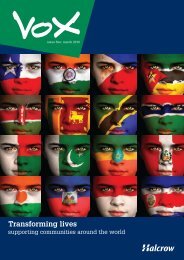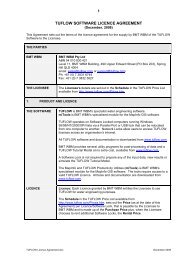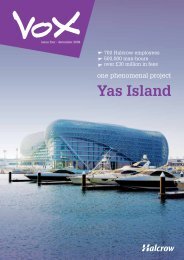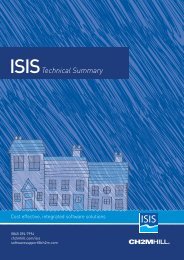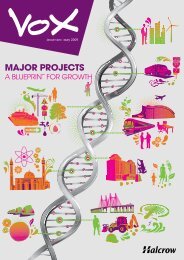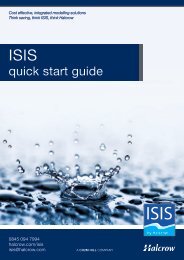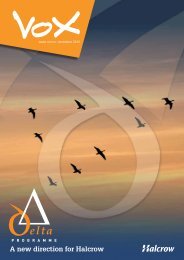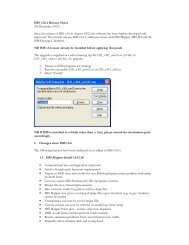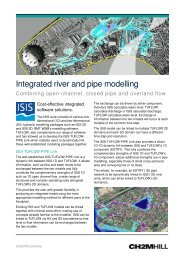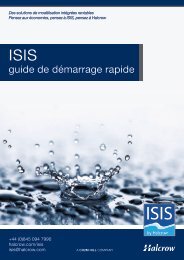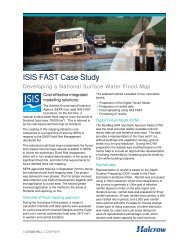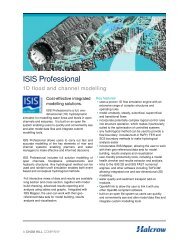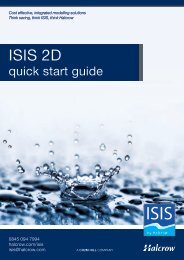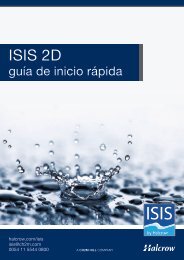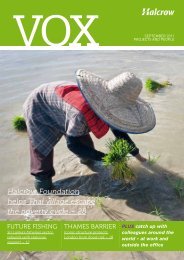December 2008 - Halcrow
December 2008 - Halcrow
December 2008 - Halcrow
You also want an ePaper? Increase the reach of your titles
YUMPU automatically turns print PDFs into web optimized ePapers that Google loves.
Longbridge Out of officeBirmingham:<br />
Development A day in the life begins...<br />
When he isn’t working as part of <strong>Halcrow</strong>’s nuclear<br />
environmental team, Jon Dolphin’s activities are<br />
rather more challenging than a game of footie or a<br />
night in front of the television.<br />
Life in the<br />
terror zone<br />
Tackling the Taliban in Afghanistan’s deadliest region<br />
n October last year, the 29-year-old<br />
I<br />
environmental consultant swapped<br />
his Warrington desk for the hellish<br />
heat of Helmand province – Afghanistan’s<br />
bloodiest and most dangerous region.<br />
Before his call-up papers arrived, Jon had<br />
spent six years in the British Territorial Army<br />
(TA) – successfully ‘passing out’ of the Royal<br />
Military Academy, Sandhurst, in 2004. He<br />
then completed his training as a specialist<br />
infantry officer and then as a demolition<br />
officer and assault pioneer – the latter being<br />
the engineers of the infantry.<br />
“On mobilisation, I joined a 146-strong<br />
infantry company of both regular and TA<br />
soldiers,” Jon explains. “I commanded a<br />
platoon of 31 soldiers, with a secondary<br />
role as media escort which provided some<br />
interesting moments.”<br />
The company was deployed to Afghanistan<br />
in October 2007, and the platoons were soon<br />
dispatched to patrol bases in the notorious<br />
‘green zone’ and forward operating bases<br />
(FOBs) around the province.<br />
On Christmas Eve, Jon’s platoon was sent<br />
to FOB Edinburgh on the outskirts of Musa<br />
Qalah, a city in the north of Helmand. Days<br />
before they arrived, the city had been retaken<br />
from Taliban control in a joint operation<br />
between the UK and Afghan national armies<br />
which had left the base uninhabitable.<br />
Jon’s platoon spent Christmas Day filling<br />
sandbags to provide some protection against<br />
attack. He patrolled the countryside, talking<br />
to locals through an interpreter and finding<br />
numerous signs of the Taliban. “We had<br />
a couple of close shaves with road side<br />
bombs,” he remembers. “One device was<br />
unfortunately triggered by a local on his<br />
tractor. Hearing the explosion from some<br />
distance away, we were able to save his life,<br />
but he was badly injured.”<br />
“The only comfort left<br />
is in comradeship,<br />
confidence in your own<br />
abilities and a sense of<br />
moral courage to do<br />
the right thing”<br />
During his six month tour of duty, there<br />
were 12 fatalities. “I was in Camp Bastion<br />
for one of the repatriation ceremonies,” said<br />
Jon. “The memory of the coffin, covered by<br />
the Union Jack, being carried onto a C130<br />
Hercules plane will stay with me forever.”<br />
In one violent example of the Taliban<br />
response to British workers assisting the<br />
Afghan government to rebuild infrastructure<br />
in the city, a local man was found beheaded.<br />
The £3.50-a-day construction worker had<br />
been warned by the Taliban to stop working<br />
on one of the development schemes and<br />
had refused. “The Taliban are a pretty nasty<br />
bunch and in many cases the only way they<br />
can control the local population is through<br />
fear,” says Jon.<br />
Local Mullahs – religious leaders – showed<br />
Jon threatening letters that had been nailed<br />
to the doors of mosques by the Taliban,<br />
warning locals not to assist the British.<br />
“It’s a difficult situation out there,”<br />
Jon explains. “Although the locals see<br />
improvements to their quality of life as a<br />
result of our intervention, it’s a daily struggle<br />
for them. Without going deep into the<br />
reasons why we’re in Afghanistan, I think we<br />
need to be there. I saw and did things so far<br />
out of my usual comfort zone that the only<br />
comfort left is in comradeship, confidence<br />
in your own abilities and a sense of moral<br />
courage to do the right thing.”<br />
Escorting BBC and ITN news teams and<br />
journalists around the province was a<br />
risky proposition. “On one occasion, I took<br />
a journalist on a battle group clearance<br />
operation, riding in the back of a Warrior<br />
armoured personnel carrier (APC). During<br />
the mission, the APC in front was blown up<br />
by a mine, and we were shot at with air burst<br />
rocket propelled grenades,” says Jon.<br />
Returning to work after seeing action was<br />
an understandably strange experience. “My<br />
colleagues have been very supportive,” he<br />
says. “I don’t think I’ve changed much, but<br />
my time in Afghanistan has certainly made<br />
me realise what’s important in life.”<br />
58<br />
Connections Vox | issue one | July <strong>2008</strong>



